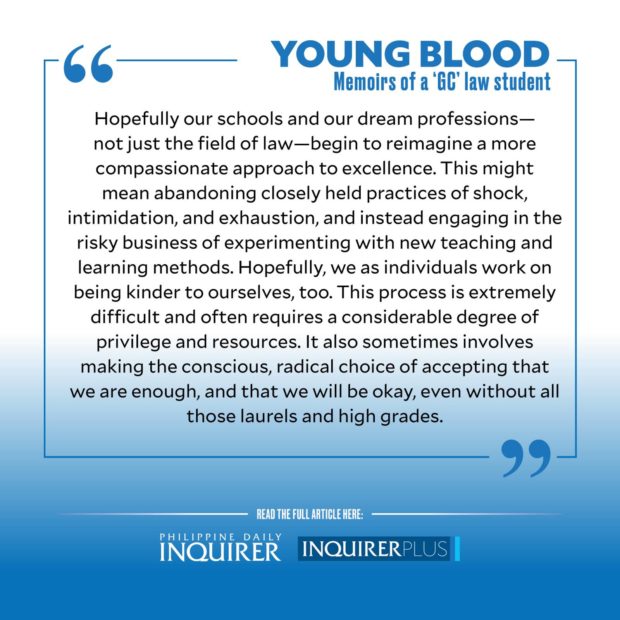Memoirs of a ‘GC’ law student
Law school is hard. It requires its students to be at their best, able to recall legal concepts at the drop of a hat or navigate complex hypotheticals with grace. This is reinforced by kilometric lists of laws and cases that need to be read and understood, and professors who, on the daily, remind their students that such sacrifice is necessary for success.
The syllabus for a regular three-unit subject, for example, is usually 20-page long. This translates to reading around 15-20 cases per meeting, plus legal provisions and commentaries. Full-time law students take anywhere between six and eight subjects per semester, which works out to about 90 to 160 cases per week. Add to that the constant possibility of being called to recite, and the anxiety of flubbing or failing.
Article continues after this advertisementExam weeks become almost unbearable, with each exam bearing specific pains. During midterms, students are expected to study the exam coverage but are also required to continue revising for their usual class participation requirements. During finals, students are almost always ordered to master the entire course coverage.
It gets much harder for a grade-conscious student (“GC” as we called it in undergrad). The usual triumph in law school is getting a passing grade. In most cases, this is a 75, which by itself is already hard to achieve. For those who are “GC,” a passing grade is not nearly enough. Nothing short of a 90, or higher, will be satisfactory. I’ve talked to people who were lamenting a 95 because they “could have done better.” I’ve encountered a student who celebrated a 76 because it meant not having to repeat the class next semester.
This presumes a rational and objective grading scale. Imagine the stress when it involves a professor who arbitrarily rates students (e.g., darts, “either you get a 3.0 or a 5.0,” and many more), or when class performance suffers because of sickness or death in the family.
Article continues after this advertisementThis behavior might seem ridiculous because grades are just numbers. But after several personal reflections and conversations with other “GC” students, I’ve come to realize that the compulsive urge to attain high grades often comes from self-imposed pressure to do extremely well in school. For others, it emanates from their parents, or from persons who finance their schooling. In both cases, the result is an almost-constant feeling of inadequacy. These feelings are magnified when put in an environment in which students are frequently and deliberately told that they are nowhere near good enough to become lawyers.
When I told my therapist about this problem, he said that perhaps I clung to my grades because I often relied on validation from others for my happiness. He told me that there was nothing wrong with wanting to do better, but at some point, gunning for too much would get in the way of celebrating a job well done.
On one hand, his analysis made perfect sense. The self-imposed pressure and anxiety produced by being excessively “GC” took a massive toll on my mental health. He asked me a gut-wrenching question: “if you take away being an achiever, who are you?” That really took me for a spin and made me question why I was so hard on myself.
On the other hand, the profession which I hope to join is so demanding and cut-throat. My fellow law students and I are constantly bombarded with the notion that we need to perform at the peak of excellence because the country and the clients deserve nothing less. Exacting standards are imposed not just by the Supreme Court, but by all actors in the profession. To “make it,” we are told we need exemplary grades and a laundry list of other achievements. I take it more seriously because I have no prior connections to the legal profession, and I have to work several jobs in the meantime. I come from an unknown family from the province, with no other means of establishing a comfortable life for us except by doing extraordinarily well.
I’m slowly learning how to be more mindful about my feelings for my grades, but the struggle continues. I acknowledge that some of these issues are mine to resolve, but I also know that many other students share these feelings of inadequacy because they are constantly made to feel that way.
Hopefully our schools and our dream professions — not just the field of law — begin to reimagine a more compassionate approach to excellence. This might mean abandoning closely held practices of shock, intimidation, and exhaustion, and instead engaging in the risky business of experimenting with new teaching and learning methods.
Hopefully, we as individuals work on being kinder to ourselves, too. This process is extremely difficult and often requires a considerable degree of privilege and resources. It also sometimes involves making the conscious, radical choice of accepting that we are enough, and that we will be okay, even without all those laurels and high grades.
* * *
Robert Sanders, 24, is a third-year evening student at the UP College of Law. He currently works with a program that seeks to reform legal education and looks forward to a future in which law students need not be traumatized in order to become good lawyers.

















